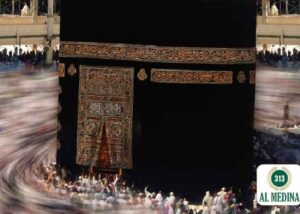Is it Wajib to perform Tawaf Wada (Tawaf Sadr) when you leave Makkah Shareef after Umrah, according to the Hanafi Madhab?
Quran
Hadith
Islamic Text
No, it is not Wajib to perform Tawaf Sadr or Wada when you leave Makkah Shareef after Umrah, according to the Hanafi Madhab. Rather, the Hanafi scholars said Tawaf al-Sadr (Wada) is for Hajj not for Umrah.
عَنْ ابْنِ عُمَرَ، قَالَ: «مَنْ حَجَّ البَيْتَ فَلْيَكُنْ آخِرُ عَهْدِهِ بِالبَيْتِ إِلَّا الحُيَّضَ، وَرَخَّصَ لَهُنَّ رَسُولُ اللَّهِ صَلَّى اللَّهُ عَلَيْهِ وَسَلَّمَ»: حَدِيثُ ابْنِ عُمَرَ حَدِيثٌ حَسَنٌ صَحِيحٌ، وَالعَمَلُ عَلَى هَذَا عِنْدَ أَهْلِ العِلْمِ
(Sayidina Abdullah) Ibn Umar (May Allah Most High be pleased with them both) said, ‘Whosoever performs Hajj, then let his final action be at the House (Ka’bah Shareef). However, the Messenger of Allah ﷺ provided a dispensation for the woman in a state of menstruation.’ The Hadith of Ibn Umar is Hasan Sahih, and the action of the people of knowledge is upon this. (Sunan al-Tirmidhi 944, Hasan Sahih).
There is a difference of opinion amongst the scholars regarding Tawaf al-Sadr, which is also called Tawaf al-Wada. The Hanafi position is that Tawaf Wada (Sadr) is not part of Umrah, rather it is limited to Hajj. Hanafi scholars have quoted the narration above to support this opinion.
Therefore, it is incorrect to say that Tawaf al-Sadr (Wada) is Wajib for a person performing Umrah, according to the Hanafi school. This has been mentioned in numerous authoritative works of the Hanafi Madhab.
وَطَوَافُ الصَّدْرِ وَاجِبٌ عَلَى الْحَاجِّ إذَا أَرَادَ الْخُرُوجَ مِنْ مَكَّةَ فَلَيْسَ عَلَى الْمُعْتَمِرِ طَوَافُ الصَّدْرِ. (الفتاوى الهندية).
Tawaf al-Sadr (al-Wada) is Wajib upon the person performing Hajj when he wants to leave Makkah (Shareef). There is no Tawaf al-Sadr (al-Wada) upon a person performing Umrah. (al-Fatawaa al-Hindiyah).
وَلَا يجب على الْحَائِض وَالنُّفَسَاء، وَلَا على الْمُعْتَمِر لِأَن وُجُوبه عرف نصا فِي الْحَج، فَيقْتَصر عَلَيْهِ. (عمدة القاري شرح صحيح البخاري).
It (Tawaf al-Sadr) is not Wajib (obligatory) upon a woman in a state of menstruation (Hayd) or postnatal bleeding (Nifaas), nor upon a person performing Umrah. This is because it being Wajib is known through explicit text (Nass) for Hajj. Therefore, it is limited to it (Hajj). (Imam al-Ayni, Umdatu al-Qari Sharh Sahih al-Bukhari).
وَلَيْسَ عَلَى الْمُعْتَمِرِ طَوَافُ الصَّدَرِ. (المبسوط).
There is no Tawaf al-Sadr (al-Wada) upon a person performing Umrah. (Imam al-Sarakhsi, al-Mabsoot).
وَلَيْسَ عَلَى الْمُعْتَمِرِ طَوَافُ الصَّدْرِ – ذَكَرَهُ فِي التُّحْفَةِ. (مرقاة المفاتيح شرح مشكاة المصابيح).
There is no Tawaf al-Sadr (al-Wada) upon a person performing Umrah, as mentioned in al-Tuhfah. (Imam Ali al-Qari, Mirqaat al-Mafateeh).
وَلَا عَلَى الْمُعْتَمِرِ مُطْلَقًا. (وَلَا عَلَى الْمُعْتَمِرِ مُطْلَقًا).
There is absolutely no (Tawaf al-Sadr) upon a person performing Umrah. (Imam Ibn Abideen, Radd al-Muhtaar).
وَلَيْسَ عَلَى الْمُعْتَمِر طَوَافُ الصَّدَرِ ذَكَرَهُ فِي التُّحْفَةِ. وَفِي إثْبَاتِهِ عَلَى الْمُعْتَمِرِ حَدِيثٌ ضَعِيفٌ رَوَاهُ التِّرْمِذِيُّ. وَفِي الْبَدَائِعِ قَالَ أَبُو يُوسُفَ – رَحِمَهُ اللَّهُ -: أَحَبُّ إلَيَّ أَنْ يَطُوفَ الْمَكِّيُّ طَوَافَ الصَّدَرِ. (فتح القدير).
There is no Tawaf al-Sadr (al-Wada) upon a person performing Umrah, as mentioned in al-Tuhfah. The Hadith narration establishing it for Umrah is weak, narrated by Imam al-Tirmidhi. In al-Badai (he narrates that) Abu Yusuf (May Allah Most High have mercy upon him) said, it is more pleasing to me that a person from Makkah performs Tawaf al-Sadr. (Imam Ibn al-Humaam, Fath al-Qadeer).
وَلَيْسَ على المعتمرين من أهل الأفاق طواف الصَّدْر أَيْضا لِأَن ركن الْعمرَة هُوَ الطّواف فَكيف يصير رُكْنه تبعا لَهُ. (تحفة الفقهاء).
There is no Tawaf al-Sadr (al-Wada) upon people from the Aafaaq (outside the Mawawqeet) who are performing Umrah. This is because the pillar (Rukn) of Umrah is Tawaf, so how could the pillar (Rukn) come after it. (Imam Ala al-Deen al-Samarqandi, Tuhfatu al-Fuqahah).
As well as the numerous explicit Nusoos (texts) clarifying that there is no Wajib Tawaf al-Wada (Sadr) for Umrah, it is also clarified by studying Umrah in the books of the Hanafi Madhab. When Hanafi scholars mentioned the details of Umrah in their books, they did not include Tawaf Sadr (Wada). This indicates that Tawaf Wada is not part of Umrah. However, the Hanafi scholars were far more explicit, and clearly mentioned that there is no Tawaf al-Sadr for Umrah. Rather it is for Hajj alone.
[وَاجِبَات الْعُمْرَة] (وَأَمَّا) وَاجِبَاتُهَا فَشَيْئَانِ: السَّعْيُ بَيْنَ الصَّفَا وَالْمَرْوَةِ، وَالْحَلْقُ أَوْ التَّقْصِيرُ.
فَأَمَّا طَوَافُ الصَّدْرِ فَلَا يَجِبُ عَلَى الْمُعْتَمِرِ، وَقَالَ الْحَسَنُ بْنُ زِيَادٍ يَجِبُ عَلَيْهِ كَذَا ذَكَرَ الْكَرْخِيُّ وَجْهُ قَوْلِهِ: إنَّ طَوَافَ الصَّدْرِ طَوَافُ الْوَدَاعِ وَالْمُعْتَمِرُ يَحْتَاجُ إلَى الْوَدَاعِ، كَالْحَاجِّ، وَلَنَا أَنَّ الشَّرْعَ عَلَّقَ طَوَافَ الصَّدْرِ بِالْحَجِّ. (بدائع الصنائع في ترتيب الشرائع).
The Wajib actions of Umrah: As for the Waajib actions related to it (Umrah), they are al-Saee between Safa and Marwah, and shaving or cutting the hair.
As for Tawaf al-Sadr (al-Wada), it is not Wajib upon a person performing Umrah. Al-Hasan bin Ziyaad said it is Wajib upon him, as mentioned by al-Karkhi. His opinion is explained by saying Tawaf al-Sadr is Tawaf al-Wada, and the person performing Umrah is in need of al-Wada (farewell) just like the person performing Hajj. However, we (the Hanafis) say that the Sharia connected Tawaf al-Sadr (al-Wada) to Hajj (not Umrah). (Imam al-Kaasaani, Badai al-Sanai).
It is important to recognise that this is the Hanafi opinion regarding Tawaf al-Sadr (Wada). The Shafi Madhab has a different opinion regarding Tawaf al-Sadr after Umrah, the details of which should be sought from Shafi scholars. As Ahl al-Sunnah we respect all valid differences of opinion found within the four Madhabs. However, a person teaching this issue from the Hanafi perspective should provide the Hanafi opinion.
And Allah Most High Knows Best.
– Answered by Shaykh Noorud-deen Rashid (30.05.2022)
See also:
Two Rakahs after Tawaf Nafl or Wajib?
See also (video):






